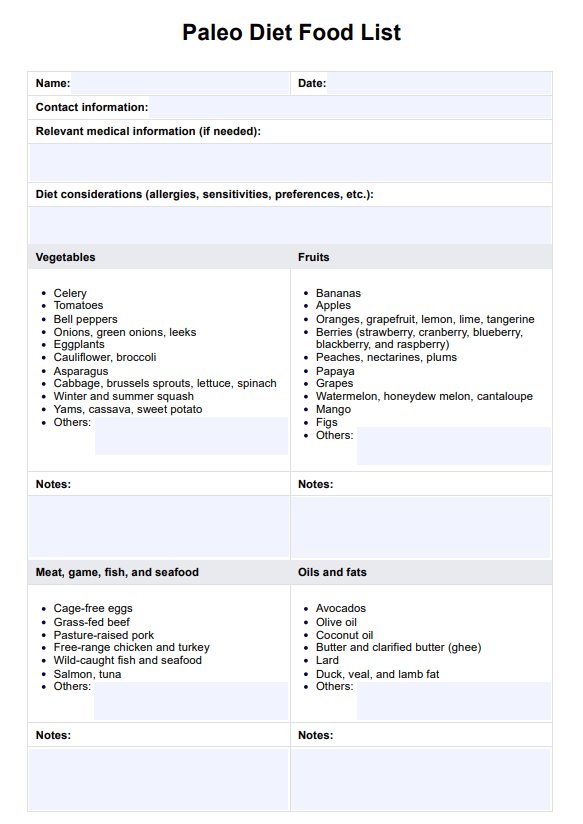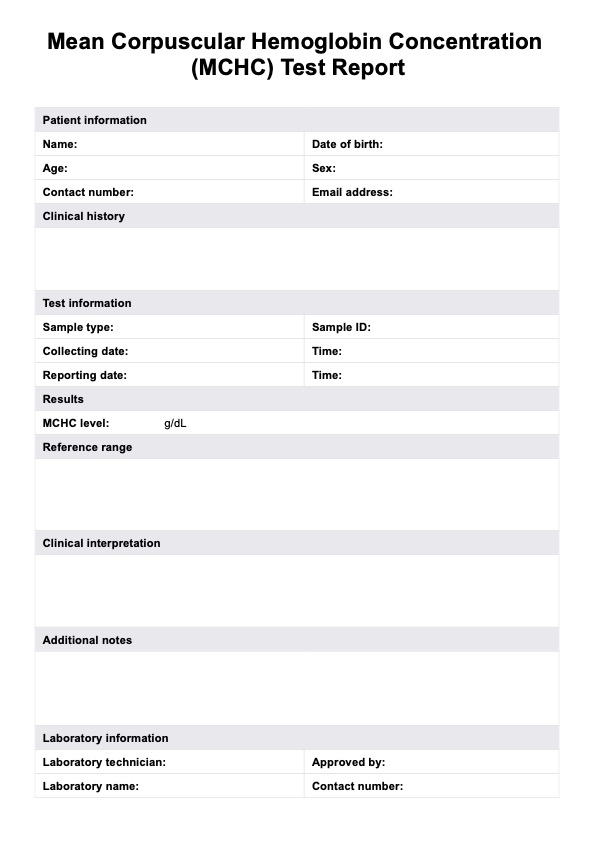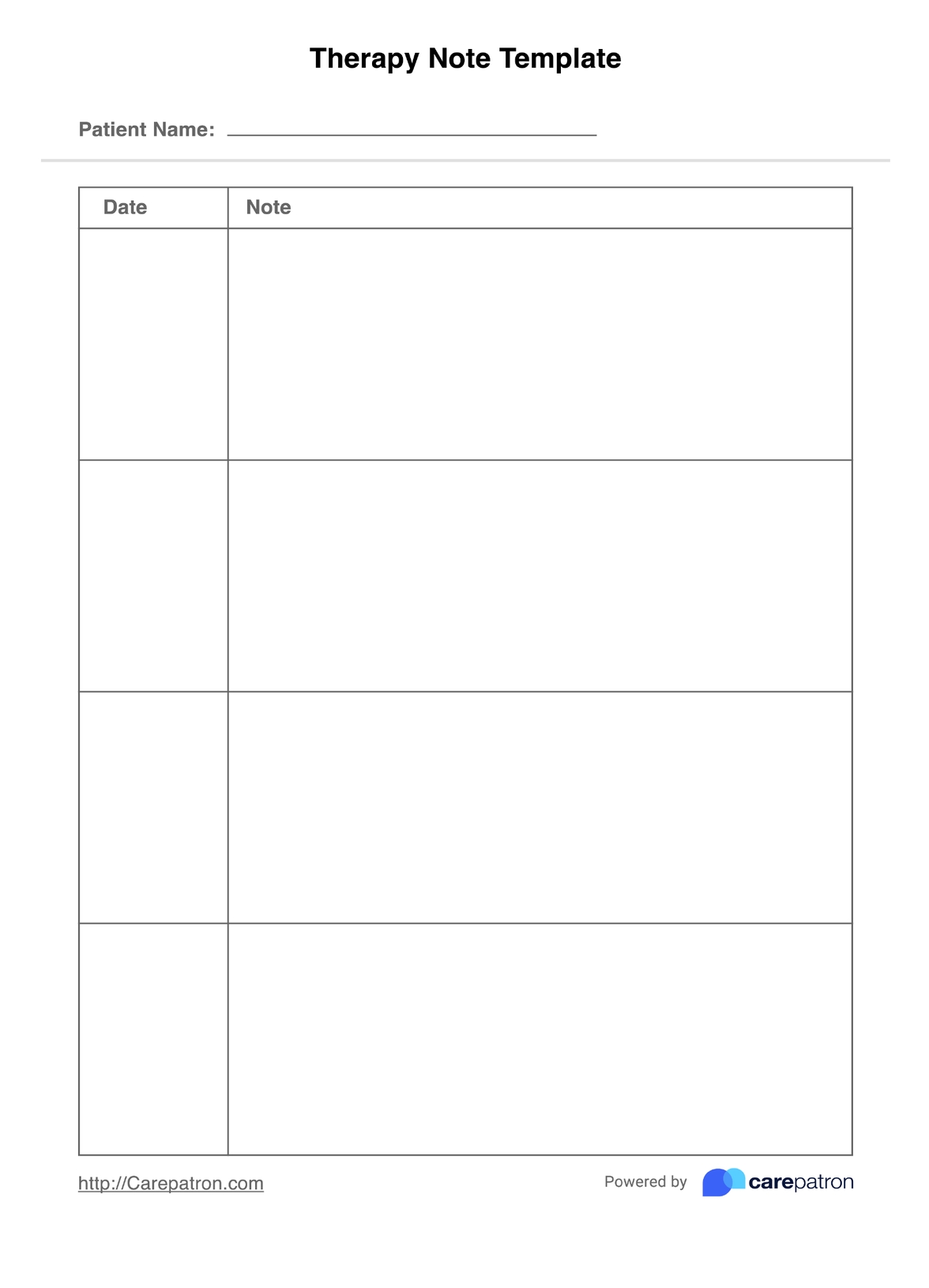MEQ Test
Give your patients a MEQ or Morningness-Eveningness Questionnaire to understand more about their circadian rhythm. Click here for a copy and more information.


What is the Morningness-Eveningness Questionnaire (MEQ)?
Do you consider yourself a morning lark or a night owl? The Morningness-Eveningness Questionnaire (MEQ), or MEQ Test, is a valuable tool that determines this. This test assesses individual differences in human circadian rhythms and sleep-wake preferences.
The MEQ is a self-assessment questionnaire developed by researchers James A. Horne and Olov Östberg in 1976 to determine an individual's chronotype or natural inclination towards morningness or eveningness (Horne & Östberg, 1976). The questionnaire consists of 19 items that evaluate a person's preferred times for sleep, physical activity, and mental alertness.
Understanding a patient's chronotype can be crucial for healthcare practitioners in various contexts:
- Sleep disorders: The MEQ can help diagnose and manage a circadian rhythm disorder.
- Shift work: Knowledge of chronotype and circadian peak can help optimize work schedules and improve the well-being of shift workers.
- Treatment timing: Chronotype may influence the efficacy of certain medications and treatments.
- Mental health: Chronotype has been associated with various mental health outcomes and can inform treatment approaches.
However, it's important to note that while the MEQ is a valuable tool, it does have limitations. The original questionnaire was primarily validated in a student population, which led to subsequent research examining its applicability across different age groups and cultures (Paine et al., 2006). Additionally, external factors such as work schedules, family responsibilities, and social obligations can influence MEQ responses, potentially masking an individual's true biological preference.
While it shouldn't be used in isolation, it provides a solid foundation for understanding individual differences in circadian rhythms and can guide personalized approaches to health and well-being.
MEQ Test Template
MEQ Test Example
Chronotypes and circadian rhythms
Chronotypes are categorized into three main groups: morning types, evening types, and intermediate types. These classifications reflect differences in human circadian rhythms, which are influenced by various biological and environmental factors. Furthermore, these differences are found through oral temperature curves and core body temperature rhythms.
Morning types, often referred to as "larks," tend to:
- Wake up and go to bed earlier
- Significantly earlier peak time
- Have higher daytime temperature and lower post-peak temperature
Evening types, or "owls," typically:
- Prefer later sleep and wake times
- Reach peak alertness later in the day
- Exhibit a later circadian phase
Intermediate types fall between these extremes and represent a significant portion of the population.
How does the Morningness-Eveningness Questionnaire (MEQ) Test work?
Our MEQ Test template can be helpful for healthcare practitioners in different contexts. Here are some steps you can follow to maximize this tool in your practice:
Step 1: Obtain a template copy
Ensure you have easy access to the MEQ Test template for your convenience. You can click the “Download Template” or the “Use Template” button to download a copy. Alternatively, search for the “MEQ Test” in Carepatron's template library to locate the chart.
Step 2: Answer the test
When you give your client a copy of the MEQ, give them the time and space to complete the questionnaire. Remind them of the instructions to ensure the accuracy of the results.
Step 3: Score and interpret
After the client answers the test, assign a point value to their answers. Refer to the last column for the corresponding point value per answer. Then, add up the points you've obtained. Typically, those who have a preference for morningness (“morning larks”) have higher points, and those who have eveningness (“night owl”) will have lower points.
Step 4: Store the template securely
You must ensure the filled-out template is securely stored after the consultation, limiting access to relevant parties only. We recommend using Carepatron, a free patient records software that meets global security guidelines to protect all patients' medical records for digital copies.
What do the results mean?
The test generates a composite score based on the responses, which indicate the degree to which an individual is inclined to be a “morning lark”, “night owl”, or somewhere in between.
Here’s a list of the MEQ scores interpretations:
- Scores of 70 and above: Any score equivalent to or greater than 70 strongly indicates that the individual is a “morning type,” which means they are inclined to feel most alert and productive during the morning hours. These people tend to wake up early and often have an easier time adjusting to traditional school and work schedules.
- Scores between 59 and 69: Any score between 59 and 69 suggests a moderate preference for the morning, wherein they still tend to be more productive and after in the morning compared to the evening.
- Scores ranging from 42 to 58: Any score that falls between this range falls under the “neither type” category or in between, wherein they don’t strongly favor mornings or evenings and have a more flexible approach to daily routines.
- Scores between 31 and 41: Any score between 31 and 41 indicates a moderate evening preference and is still classified under ‘evening types” because it’s easier for them to perform tasks and focus during the late hours.
- Scores of 30 and Below: Any score equivalent to or lower than 30 are “evening types.” They are most productive and alert in the evenings and may find it challenging to wake up early in the morning.
References
Horne, J. A., & Ӧstberg, O. (1976). Morningness-Eveningness Questionnaire [Database record]. APA PsycTests. https://doi.org/10.1037/t02254-000
Paine, S. J., Gander, P. H., & Travier, N. (2006). The epidemiology of morningness/eveningness: influence of age, gender, ethnicity, and socioeconomic factors in adults (30-49 years). Journal of Biological Rhythms, 21(1), 68–76. https://doi.org/10.1177/0748730405283154
Commonly asked questions
The Morningness-Eveningness Questionnaire (MEQ) is a self-assessment tool that measures an individual's circadian preference, or their natural inclination to be more of a "morning person" (morning-type) or an "evening person" (evening-type). It assesses an individual's preferred timing for sleep, wakefulness, and daily activities.
An "intermediate" result on the MEQ indicates that the individual does not strongly prefer either morning or evening schedules. They exhibit a more balanced circadian rhythm and can easily adapt to both.
The MEQ consists of 19 multiple-choice questions that assess various aspects of an individual's sleep-wake preferences and daily habits. Each question is scored on a scale, and the total score ranges from 16 to 86. Scores are then categorized as morning-type (59-86), intermediate-type (42-58), or evening-type (16-41), indicating the individual's circadian preference.


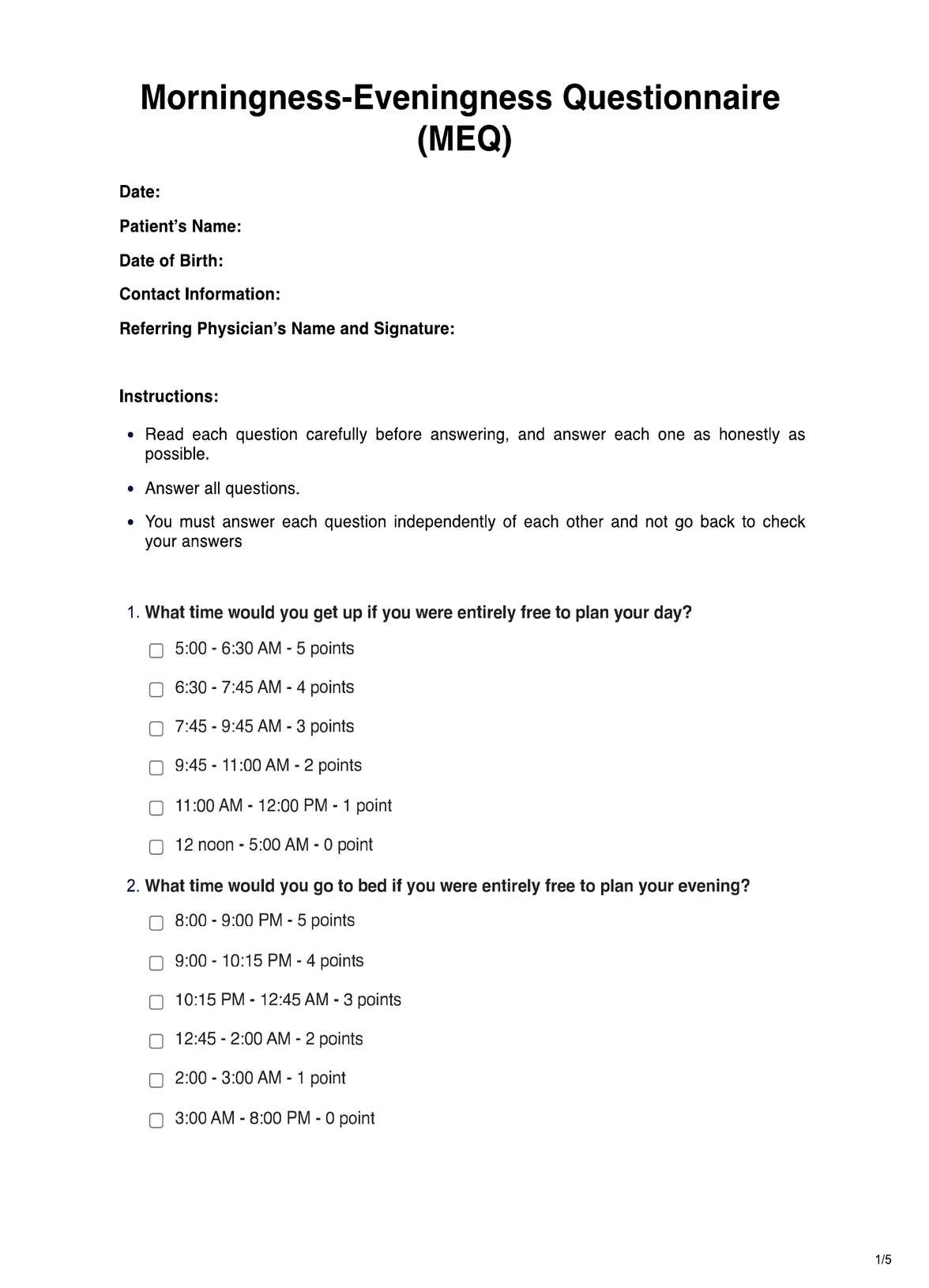
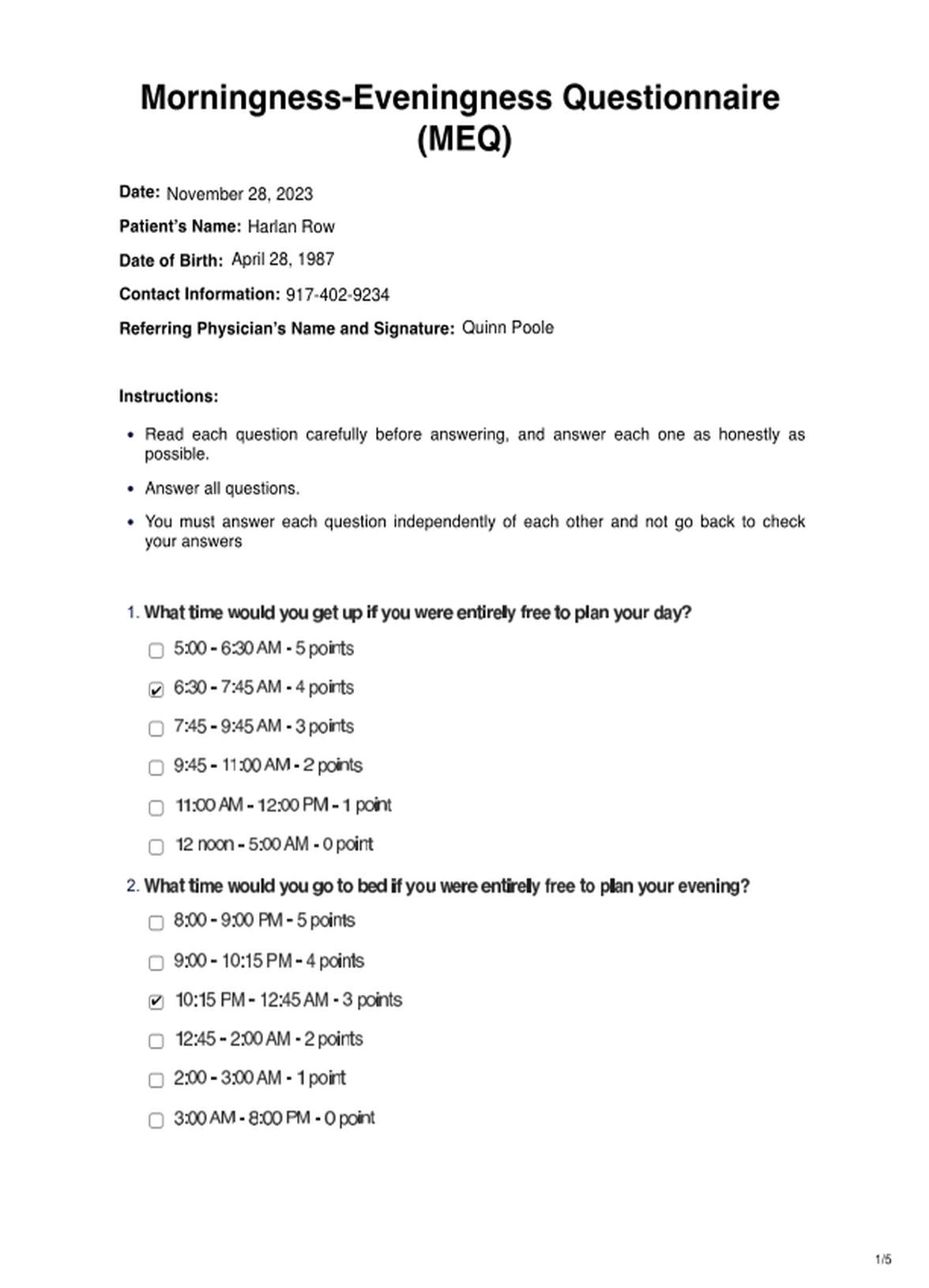





















-template.jpg)














































































